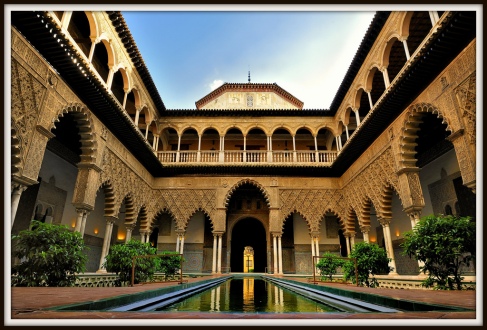The exchange between the second caliph ‘Umar ibn al-Khattab (d. 644) and Hurmuzan, one of the Persian princes who was taken captive and sent to Medina during the course of the Arab conquest of Iran is well known. Muslim tradition asserts that the latter converted to Islam and became an important political/military adviser to ‘Umar. This poem, written in the late nineteenth century, is an interesting representation of the initial exchange between the two men. Continue reading
Monthly Archives: October 2013
Final Sermon of the Caliph Uthman ibn Affan (d. 656)
The last sermon preached by ‘Uthmān ibn ‘Affān [third caliph, r. 644-656] before a congregation was this: “Verily, Almighty God has only given you this world so that through it you may seek the next. He did not give it to you as something to rely on. Verily this world will vanish and the next will endure. Perishable things must not make you heedless and distract you from things everlasting. Prefer that which endures to that which perishes, for this world will pass away, and God is the ultimate goal of our journey. Fear Almighty God, for fear of Him is a shield against evil and a means to dwell with Him. Beware lest God’s [favor toward you] be altered, cling to your community and do not be divided into factions, and ‘He brought your hearts together so that by His blessing you became brothers’ [Q. 3: 103] Continue reading
Tomb of al-Mu’tamid ibn ‘Abbad (d. 1095) in Aghmat, Morocco
Historical information about al-Mu’tamid: http://www.saudiaramcoworld.com/issue/199301/the.poet-king.of.seville.htm
His tomb:
قبر الغريب سقاك الرَائحُ الغادي
حقاً ظفرت بأشلاء ابن عبَاد
بالحلم، بالعلم، بالنَعمى إذا اتصلت
بالخصب إن أجربوا، بالريَ للعبَادي
بالطَاعن، الضَارب، الرَامي إذا اقتتلوا
بالموت أحمر، بالضَرغاجة العادي
بالدَهر في نِقَمٍ، بالبحر في نِعَمٍ
بالبدر في ظُلمٍ، بالصَدر في النادي
نعم، هو الحقَُ وافاني به قدرٌ
من السماء، فوافاني ل
ولم أكن قبل ذاك النعش أعلمُه
أنَ الجبال تهادى فوق أعواد
كفاك فارفُق بما استودعت من نجومٍ
روَاك كُلُ قطوبُ البرق رعَاد
يبكي أخاه الذي غيَبت وابله
تحت الصفيح، بدمع رائح غادي
حتى يجودك دمعُ الطلَ منهمراً
من أعين الزهرُ لم تبخل بإسعاد
ولا تزال صلواتُ الله دائمةً
على دفينك لا تُحص بتعداد

After having been the emir of the rich and powerful Taifa kingdom of Sevilla until 1091, al-Mu’tamid was exiled to North Africa by the Almoravids. Some of al-Mu’tamid’s poetry (in translation) written during his captivity in Morocco:
In days gone by the festivals made thee joyous,
But sad is the festival which findeth thee a captive at Aghmat.
Thou seest thy daughters clothed in rags and dying of hunger;
They spin for a pittance, for they are destitute.
Worn with fatigue, and with downcast eyes, they come to embrace thee.
They walk bare-footed in the mire of the streets,
Who once trod on musk and camphor!
Their hollow cheeks, furrowed with tears, attest their poverty….
Just as on the occasion of this sad festival—
God grant that thou mayest never see another! –
Thou hast broken thy fast, so has thy heart broken hers:
Thy sorrow, long restrained, bursts for afresb.
Yesterday, when thou spakest the word all men obeyed;
Now thou art at the beck of others.
Kings who glory in their greatness are dupes of a vain dream!
“Woo not the world too rashly, for behold,
Beneath the painted silk and broidering,
It is a faithless and inconstant thing.
(Listen to me, Mu’tamid growing old.)
And we–that dreamed youth’s blade would never rust,
Hoped wells from the mirage, roses from the sand–
The riddle of the world shall understand
And put on wisdom with the robe of dust.”
(Alcazar in Sevilla, former site of al-Mu’tamid’s palace)




